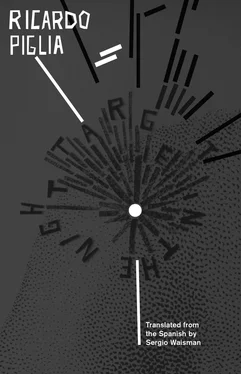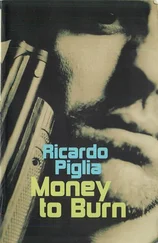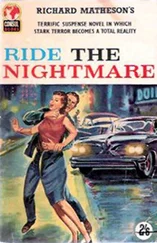Ricardo Piglia - Target in the Night
Здесь есть возможность читать онлайн «Ricardo Piglia - Target in the Night» весь текст электронной книги совершенно бесплатно (целиком полную версию без сокращений). В некоторых случаях можно слушать аудио, скачать через торрент в формате fb2 и присутствует краткое содержание. Год выпуска: 2015, Издательство: Deep Vellum, Жанр: Современная проза, на английском языке. Описание произведения, (предисловие) а так же отзывы посетителей доступны на портале библиотеки ЛибКат.
- Название:Target in the Night
- Автор:
- Издательство:Deep Vellum
- Жанр:
- Год:2015
- ISBN:нет данных
- Рейтинг книги:3 / 5. Голосов: 1
-
Избранное:Добавить в избранное
- Отзывы:
-
Ваша оценка:
- 60
- 1
- 2
- 3
- 4
- 5
Target in the Night: краткое содержание, описание и аннотация
Предлагаем к чтению аннотацию, описание, краткое содержание или предисловие (зависит от того, что написал сам автор книги «Target in the Night»). Если вы не нашли необходимую информацию о книге — напишите в комментариях, мы постараемся отыскать её.
is an intense and tragic family history reminiscent of
, in which the madness of the detective is integral to solving crimes.
, a masterpiece, won every major literary prize in the Spanish language in 2011.
Ricardo Piglia
Target in the Night — читать онлайн бесплатно полную книгу (весь текст) целиком
Ниже представлен текст книги, разбитый по страницам. Система сохранения места последней прочитанной страницы, позволяет с удобством читать онлайн бесплатно книгу «Target in the Night», без необходимости каждый раз заново искать на чём Вы остановились. Поставьте закладку, и сможете в любой момент перейти на страницу, на которой закончили чтение.
Интервал:
Закладка:
When his brother betrayed him, Luca wandered around the roads, aimless, lost. He’d shown up that afternoon at their company’s town offices without telling anyone he was coming, and had surprised his brother in an unannounced meeting with the new shareholders and Cueto, their factory’s lawyer. They wanted to hand majority control and decision-making power of the board over to the intruders. He feared, his brother, with the rise in the dollar, and with the government’s exchange policy, that they wouldn’t be able to pay off the debts they’d acquired in Cincinnati. That was where they had purchased the large power tools — a giant steel guillotine shear and an enormous folding machine — which they could see down below, on the floor of the factory, if they leaned over edge of the balcony where they were now walking.
When he saw Luca enter unexpectedly into the offices, Lucio smiled with that smile that had connected them for decades, an intimate expression between two inseparable brothers. They’d worked together their whole life, they understood each other without having to say a word — but in that moment everything changed. Luca had left to go to Córdoba to ask for an advance from the head offices of IKA-Renault, but he’d forgotten some papers and had come back to get them, when he walked into the secret meeting. Oh, evil . He realized right away what was going on. He didn’t speak to the intruders, didn’t even look at them. They were sitting calmly around the table in the conference room when Luca entered. They looked at him in silence. He felt that his throat was dry, burning with the dust from the road. “Let me explain,” Lucio said. “It’s for the best.” As if his brother had lost his head, or was under some kind of spell. On one side of the table, Cueto, the hyena, was smiling, but Luca only blew up when he saw that his brother was also smiling like that, blissfully. There’s nothing worse than a naïve idiot who does something wrong thinking that it’s for the best, and smiles, angelically, proud of himself and his good deeds. “I saw red everywhere,” Luca said. He charged toward his brother, who was tall as a tower, and knocked him out of his chair with one punch. Lucio didn’t defend himself, which only made Luca angrier. Luca finally stopped and left his brother on the ground. He didn’t want to disgrace himself. He walked out, his head spinning, his life in shambles. He understood that his father must have convinced Lucio, that he must have frightened him first and then forced him to listen to — and accept — Cueto’s advice.
The next thing he knew, Luca was in his car, driving down the highway, because driving always calmed him down, helped lull his mind. He eventually went to the Estévez Estancia, but he didn’t remember what happened between walking in on the meeting and pulling into the country house. Later they told him that Inspector Croce found him prowling outside their family house with a gun in his hand, looking for his father, but he didn’t remember any of that. He remembered only his car lights illuminating the fence of the Estévez residence, the caretaker opening the gate for him and letting him through, reminding him which road to take up to the house. He spent several days sitting on a wooden chair, on the porch, staring out at the countryside. He smoked, drank mate , looked at the road surrounded by the poplar trees, the gravel on the road, the birds flying in circles and, beyond, the empty pampas, always quiet. Vague voices reached him from the distance, strange words and screams, as if his enemies had found a way to drive him mad. A few white, liquid lightning bolts flashed in the sky, burning his eyes in the dark. He saw a storm building on the horizon, the heavy clouds, the animals running to take refuge under the trees, the endless rain, a thin blanket of wetness on the grass. His body seemed to suffer strange transformations. He started wondering what it would be like to be a woman. He couldn’t get the idea out of his head. What would it be like to be a woman at the moment of coitus? It was a very clear and crystalline thought, like the rain. As if he were lying on the ground, out in the country, and had started sinking into the mud, a viscous feeling on his skin, a warm moisture. Sometimes he’d fall asleep and wake up with the light of morning, find himself sitting on the wooden chair on the porch, not thinking anything at all, like a zombie in the middle of nowhere.
One evening, during those days on end that were all the same, in his breakdown in the country house, he went inside to look for a blanket and found a book that he’d never heard of. The only book he found and was able to read during all those days and days of isolation in the Estévez Estancia. A book he found in an old, country wardrobe, one of those with mirrors and tall doors — in which one hides as a child to listen to the conversation of the adults — while he was searching through the winter clothes. He saw the book all of a sudden, as if it were alive, as if it were kind of a vermin, as if someone had forgotten it there, for us, for him. Man and His Symbols by Carl Jung.
“Why was it there, who had left it? That doesn’t matter. When we read it, though, we discovered what we already knew, we found a message directed personally to us. Jung’s individuation process . What’s the purpose of an individual’s entire oneiric life? That’s what the Swiss Master had asked himself. Jung discovered that the dreams that a person dreams in his life all follow an order, which the Doctor called a dream plan. Dreams produce different scenes and images every night. People who aren’t very observant probably never realize that a common thread runs through their dreams. But if we observe our dreams carefully, Jung says, over a set period of time (one year, for example), and we write the dreams down and study the entire series, we’ll see that certain contents emerge, disappear, and come back again. These changes, according to Jung, can be accelerated if the dreamer’s conscious attitude is influenced by the proper interpretation of his dreams and their symbolic content.
This is what Luca found one night looking for a blanket in an old country wardrobe in the Estévez house, as if it were a personal revelation. He discovered Carl Jung by chance, and this is how he was able to understand and later forgive his brother. But not his father. His brother was possessed. Only someone who’s possessed can betray his brother and sell himself to strangers, and let them take over the family business. His father, on the hand, he was lucid, cynical, and calculating. In secret, for days and days, he had devised a trap — with Cueto, our legal advisor —to convince Lucio to sell his preferred stocks to the intruders and hand majority control over to them. In exchange for what? His brother committed the betrayal, terrified of the economic unknown. His father — on the other hand — thought like a man from the countryside who always goes in for a sure thing.
In his isolation, Luca understood the misfortune of men tied to the ground. He achieved what he called a certainty . The countryside had destroyed his family, they were unable to escape, as his mother had done, unable to run away from the empty plains. His older brother had known, for example, the happiness of having a mother.
“But before I was born,” Luca said, using the first person singular, “my mother was already fed up with country life, with family life, she’d started secretly seeing the theater director who she’d leave my father for, when I was in her belly. My mother abandoned my brother, who was three years old, left him playing out on the patio, and escaped with a man who I will not name, out of respect. She left with the theater director and with me inside of her, when I was born the two of them were living together. But later, when I too turned three, she abandoned me (like she had abandoned my brother) and moved to Rosario, to teach English for Toil & Chat, and then she moved back to Ireland, where she lives now. I always dream about her,” Luca added, later, “about my mother, the Irishwoman.”
Читать дальшеИнтервал:
Закладка:
Похожие книги на «Target in the Night»
Представляем Вашему вниманию похожие книги на «Target in the Night» списком для выбора. Мы отобрали схожую по названию и смыслу литературу в надежде предоставить читателям больше вариантов отыскать новые, интересные, ещё непрочитанные произведения.
Обсуждение, отзывы о книге «Target in the Night» и просто собственные мнения читателей. Оставьте ваши комментарии, напишите, что Вы думаете о произведении, его смысле или главных героях. Укажите что конкретно понравилось, а что нет, и почему Вы так считаете.












